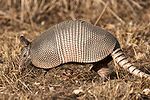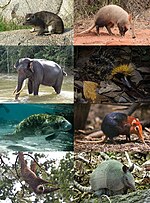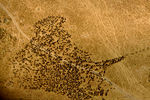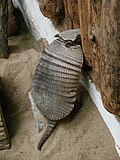Chlamyphoridae is a family of cingulate mammals. While glyptodonts have traditionally been considered stem-group cingulates outside the group that contains...
10 KB (516 words) - 00:54, 1 October 2024
two families, Dasypodidae, with Dasypus as the only living genus, and Chlamyphoridae, which contains all other living armadillos as well as the glyptodonts...
36 KB (3,519 words) - 09:22, 30 October 2024
(long-nosed or naked-tailed armadillos) were relocated to a new family, Chlamyphoridae, and glyptodonts were demoted to the subfamily Glyptodontinae. Other...
18 KB (1,522 words) - 12:36, 14 October 2024
Genus Dasypus † Genus Pliodasypus † Genus Propraopus Dasypodidae, like Chlamyphoridae, is a basal clade within Cinglata, as shown below. D. kappleri is basal...
6 KB (272 words) - 18:14, 1 October 2024
List of cingulates (section Chlamyphoridae)
containing a single genus of nine species in the subfamily Dasypodinae, and Chlamyphoridae, containing thirteen species split between the two genera in the subfamily...
38 KB (1,622 words) - 07:47, 18 November 2024
Chlamyphorinae is a subfamily of South American armadillos in the family Chlamyphoridae. Members of this subfamily, the fairy armadillos, are largely fossorial...
5 KB (323 words) - 19:31, 24 October 2024
glyptodont (an extinct group of large, herbivorous armadillos) in the family Chlamyphoridae (a family of South American armadillos) that lived from the Early Pliocene...
101 KB (11,026 words) - 12:37, 14 October 2024
one species, D. clavicaudatus. Glyptodonts are a member of the family Chlamyphoridae, which also includes some modern armadillo species, and they are classified...
29 KB (3,246 words) - 07:03, 18 November 2024
Genus †Propraopus Genus †Riostegotherium Genus †Stegosimpsonia Family Chlamyphoridae: glyptodonts and other armadillos Subfamily Chlamyphorinae: fairy armadillos...
20 KB (1,370 words) - 17:35, 1 October 2024
Tolypeutinae is a subfamily of armadillos in the family Chlamyphoridae, consisting of the giant, three-banded and naked-tailed armadillos. It contains...
8 KB (377 words) - 07:46, 30 September 2024
Euphractinae is an armadillo subfamily in the family Chlamyphoridae. Euphractinae are known for having a well developed osteoderm that has large cavities...
7 KB (437 words) - 19:20, 24 October 2024
the Chacoan fairy armadillo, is a species of armadillo in the family Chlamyphoridae. It is found in Argentina, Bolivia, and Paraguay. Its natural habitats...
5 KB (660 words) - 18:46, 27 September 2023
& Leslie, D.M. Jr. (August 2016). "Priodontes maximus (Cingulata: Chlamyphoridae)". Mammalian Species. 48 (932): 21–34. doi:10.1093/mspecies/sew002....
18 KB (1,641 words) - 03:40, 30 October 2024
Glyptodontidae, to the subfamily Glyptodontinae within the extant Chlamyphoridae. Based on this and the fossil record, glyptodonts would have evolved...
117 KB (12,956 words) - 12:36, 14 October 2024
Eutatus is an extinct genus of large armadillos of the family Chlamyphoridae. It was endemic to South America from the Early Miocene to Late Pleistocene...
4 KB (194 words) - 15:58, 18 November 2024
symbol, "†", denotes extinct groups. XENARTHRA Order Cingulata Family Chlamyphoridae: armadillos and glyptodonts Greater fairy armadillo, Calyptophractus...
26 KB (2,789 words) - 01:54, 27 October 2024
This is a list of North American mammals. It includes all mammals currently found in the United States, St. Pierre and Miquelon, Canada, Greenland, Bermuda...
174 KB (12,267 words) - 03:37, 15 November 2024
long-nosed armadillo, Dasypus pilosus Yepes's mulita, Dasypus yepesi Family Chlamyphoridae Subfamily Chlamyphorinae Genus Calyptophractus Greater fairy armadillo...
24 KB (1,779 words) - 16:52, 22 October 2024
List of North American animals extinct in the Holocene (section Chlamyphorid armadillos and glyptodonts (family Chlamyphoridae))
This is a list of North American animals extinct in the Holocene that covers extinctions from the Holocene epoch, a geologic epoch that began about 11...
130 KB (5,807 words) - 18:48, 2 October 2024
the sole member of the genus Euphractus and is placed in the family Chlamyphoridae. It was first described by Swedish zoologist Carl Linnaeus as Dasypus...
21 KB (2,524 words) - 19:04, 1 November 2024
(tropical Atlantic coasts and adjacent rivers) Order Cingulata Family Chlamyphoridae: (14 species), armadillos (Neotropical) Family Dasypodidae: (7 species)...
76 KB (6,393 words) - 21:36, 28 September 2024
List of South American animals extinct in the Holocene (section Chlamyphorid armadillos and glyptodonts (family Chlamyphoridae))
This is a list of South American animals extinct in the Holocene that covers extinctions from the Holocene epoch, a geologic epoch that began about 11...
61 KB (2,751 words) - 01:04, 10 November 2024
Animalia Phylum: Chordata Class: Mammalia Order: Cingulata Family: Chlamyphoridae Subfamily: Chlamyphorinae Genus: Chlamyphorus Harlan, 1825 Species:...
21 KB (2,454 words) - 15:08, 1 November 2024
evidence indicates is nested with modern armadillos as part of the family Chlamyphoridae, which by extension also places pampatheres within this group. Phylogeny...
8 KB (763 words) - 20:10, 18 November 2024
Animalia Phylum: Chordata Class: Mammalia Order: Cingulata Family: Chlamyphoridae Subfamily: Tolypeutinae Genus: Tolypeutes Illiger, 1811 Type species...
3 KB (249 words) - 03:24, 13 October 2024
Chaetophractus is a small genus of armadillos in the family Chlamyphoridae. It contains the following three species: Members of the genus are endemic to...
3 KB (211 words) - 00:22, 26 May 2024
Animalia Phylum: Chordata Class: Mammalia Order: Cingulata Family: Chlamyphoridae Subfamily: Tolypeutinae Genus: Tolypeutes Species: T. matacus Binomial...
4 KB (371 words) - 09:51, 18 March 2024
Genus Rhinonicteris – orange leaf-nosed bat Genus Triaenops Family Chlamyphoridae – fairy armadillos, giant armadillos, and more Subfamily Chlamyphorinae...
76 KB (6,775 words) - 23:25, 10 November 2024
southern limit of the natural distribution of C. villosus. Members of Chlamyphoridae, including C. villosus, have evolved very interesting and specific traits...
17 KB (2,049 words) - 16:42, 22 September 2024






















